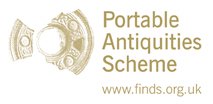Table of Contents
Introduction
A type of medieval tweezers with significantly expanded arm terminals (c. 45-50 mm in length when complete) may have had a particular function: to hold together several leaves of vellum manuscripts. The objects can have slides which presumably locked the grip. Their terminals are generally square, rectangular or trapezoidal, often with punched or engraved decoration. On the most elaborate examples the terminals were made separately and soldered to the arms; we might only see the terminals (e.g. WAW-A7AC82). ‘Page holders’ have been found at both ecclesiastical sites, such as Hulton Abbey (Klemperer and Boothroyd 2004, 161, 163; no. 44), and ostensibly secular ones, for example, Pleshey Castle (Williams 1977, 185; fig. 41, no. 9).
PAS object type to be used
Use TWEEZERS
PAS object classification to be used
Add ‘page holder’ to the Classification field
Terms to use in the description
Effectively tweezers, page holders also have a loop and two arms. Sometimes they have a slide around the arms. The terminals can be broadly square, rectangular or trapezoidal.
Date
These medieval objects tend to be dated to the 13th and 14th centuries. An example is known from a context dated to the first half of the 13th century from Winchester (Biddle and Hinton in Biddle 1990, 756; fig. 215, no. 2326A), with another from a broadly 14-century context from the Greyfriars, Norwich (Emery 2007, 144; fig. 5.41).
Examples

Search for all examples of page holders



